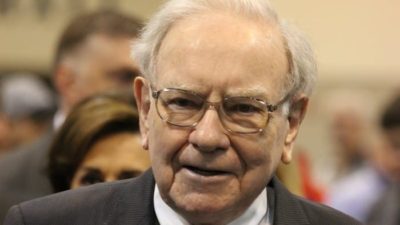If you were in front of a television this morning just before 8am, and tuned to Channel Nine, you might have seen me chatting with Karl and Sarah about credit cards.
As I said on air, until I did some research over the weekend, I had no idea that interest rates on some cards had reached 28%.
Twenty. Eight. Per. Cent. Bloody hell.
More than a quarter of your yearly balance, in interest, each year.
It is, quite simply, usurious.
I've been critical, I think completely reasonably, about the buy-now-pay-later craze of people finding new and inventive ways of mortgaging their future cashflows, but credit cards still take the cake, in terms of sheer financial impact.
(By the way, Afterpay has announced it's increasing credit limits for its customers. Because, you know, what we need is more consumer credit. Again… bloody hell…)
The easy answer, of course, is not to use them. Or to use them, but pay them off in the interest free period.
Easy answer. Hard to do, for many people.
Some didn't have a choice, needing to replace a fridge, or get a car fixed.
Some had a choice, but made a bad one, unaware or unprepared for the financial burden it would entail.
Whatever the cause, surely an almost-30% interest rate is unconscionable.
I spend a lot of time preaching about the benefits of compounding.
But compounding works in both directions – on savings and on debts.
This morning, I was asked what people could do.
The sad reality is that no-one voluntarily pays 28% (or 25%, or 20%, or 15%) unless they have to.
That is, once the money is spent, and the debt incurred, you have to pay the piper.
But if you can't pay the piper up front? Then the piper demands an increasing pound of flesh, as time goes on.
And as the debt snowballs – especially at rates that make standover men look generous – the bill gets harder and harder to pay, requiring more and more of each paycheque.
There's a reason it's called a 'debt spiral'.
And, by the way, you may have noticed (or probably didn't, because they've kept it very quiet) that the banks are also starting to shorten their interest-free periods for many cards.
You might have guessed by now that, other than in cases of emergency, I hate consumer debt (i.e. debt used for consumption, rather than purchasing an asset).
It is a cancer on your finances. At the risk of being called Grandpa, I'm from the 'spend what you can afford or have already saved' camp.
It's better for your financial health, and it helps develop financial discipline. Without it, you run the very real risk of being sucked into a debt spiral… or just running your financial life too close to the wind.
The fitness influencers suggest that 'nothing tastes as good as thin feels'.
I can't say I'd know… But I do know that, in my experience and from much of the research, there is a very high correlation between financial health and emotional and physical wellbeing, thanks to far lower levels of stress and worry about finances.
Sure, you might have to readjust your financial expectations, and maybe forgo a little spending in the short term.
But the dopamine hit from retail spending pales into insignificance compared to the feeling of financial comfort, knowing that you are prepared for whatever life has to throw at you, without paying stupidly high interest bills for the privilege.
—
And speaking of unstable finances, the longish drive to and from the Channel Nine studios gave me a chance to catch up on some audiobook listening.
Michael Lewis is always an engaging and fascinating author, and I started listening to Boomerang, covering some of the global fallout of (and contributing to) the Global Financial Crisis of 2008/9.
In the early chapters he covers Iceland's incredibly rapid ascent from small, regional economy, to massive financial player.
You might know that the whole thing went – unsurprisingly – badly.
But, of course, Lewis tells the story as it unfolds, so we get to see how it got that bad in the first place.
It's a story of unbridled greed, as most of these things are.
It's also a story of convenient explanations: people telling themselves and each other what they want to believe: Iceland was special. Other people didn't understand. Or they were just jealous. It was different this time…
Of course, it wasn't different that time. Or the time before. Or the time after.
But that doesn't mean people weren't sucked in. In large numbers.
Other people were getting rich. The stories seemed plausible, if you suspended just enough disbelief.
The true believers were all in. How bad could it really be? And hey, I'll get out before it goes really bad.
And so, unfortunately, it goes.
And why am I telling you all this?
Because it won't be different the next time, either.
Otherwise smart people will be offering plausible explanations.
Asset prices – specific assets, or assets in general – will be rising.
Your next door neighbour will be getting rich.
Even though it won't make any sense, you'll start to wonder if, perhaps, they're right. Perhaps it's different this time after all?
Remember, back at the time of the dot.com boom, business magazine Barron's famously published an article titled 'What's Wrong, Warren?'. The inference was that Warren (Buffett, of course) had lost the plot and just wasn't keeping up with the 'new economy' of dot.com superstars.
We know how that ended. The NASDAQ lost 80%-plus of its value, and Buffett was vindicated.
But – and this is important – Buffett didn't try to time the market. He didn't try to make money by short-selling tech stocks (making money when prices fell). He didn't do anything different at all.
He just refused to be pushed off his line. He knew where he was going, how he was going to invest, and what he thought would generate long-term compound returns.
And he just kept doing it, no matter what others thought, said, or did.
See, success comes from finding what works, over the long term, then… just doing it.
You don't have to react to every boom and bust. Indeed, trying to do that is a dangerous pursuit. Just ask Iceland. Or US real estate speculators. Or dot.com investors in 1999. Or NFT buyers (NFTs were those 'digital originals'; monkeys and other stuff that apparently people were going to pay millions for. And did… for a while, before they didn't). Or those who invested in various crypto tokens themselves.
—
And that's kinda what draws these two seemingly different stories together: the reality that getting ahead of ourselves is probably going to see things end badly. And that, even if they don't, it was a bad bet, regardless.
It's possible to win a round of poker with a bad hand. But not likely.
It's possible to make money with a 'this time it's different' thesis. But that's not likely, either.
And it's possible to use credit card debt wisely. But the evidence is that many, many people don't, and end up being financially crippled as a result.
Deep down, I think we all know the right thing to do, financially. Sometimes circumstances cruel our chances. Other times, our innate humanity: greed, envy and an inability to correctly envisage long term (positive and negative) consequences, tears us asunder.
Sometimes it's relatively easy to think you can spot a bubble. Other times you get caught up in it, and it's much harder.
Icelanders tried to become the exception. So did crypto speculators. Others before. Others, again, in the future. Because that's the nature of things.
The superpower to nurture might just be the ability to stay the course, while others fly higher. Because they'll very likely end up too close to the sun.
To mix my myths and fables, as I tweeted the other day, if I was to produce a bumper sticker, it would simply read:
"Investing: Aesop was right. The tortoise wins."
I hope you'll keep that in mind.
Fool on!









